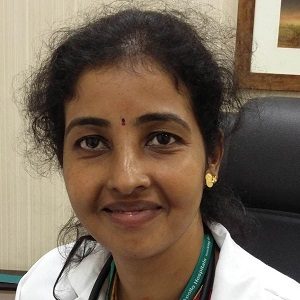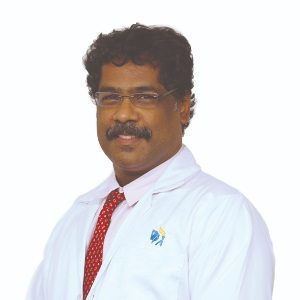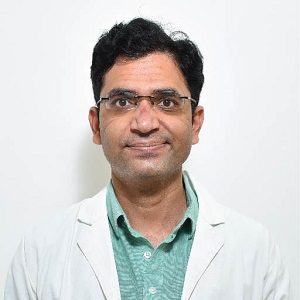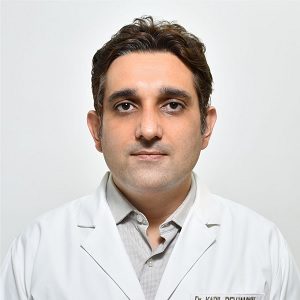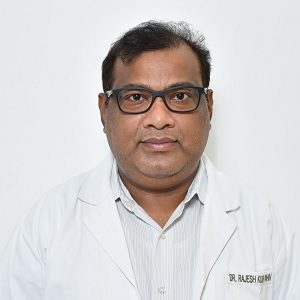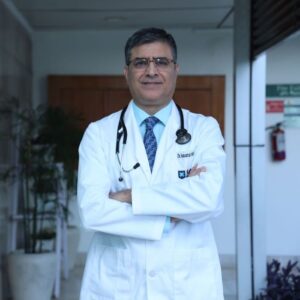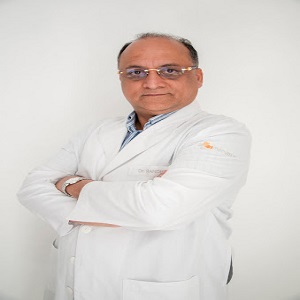Best Doctors in India for Liver Biopsy
- Gastroenterologist and GI Medicine Specialist, Chennai, India
- Over 18 years’ experience
- Apollo Hospitals Greams Road
Profile Highlights:
- Dr. Preethi M is one of the best gastroenterologists in India, with 18 years of expertise.
- Dr. Preethi received many awards for her contribution to the field.
- She offers consultation for Irritable Bowel Syndrome (IBS), Hemorrhoids, Endoscopy, female problems, and other gastrointestinal issues.
- Gastroenterologist and GI Medicine Specialist, Chennai, India
- Over 23 years’ experience
- Apollo Hospitals Greams Road
Profile Highlights:
- Dr. Ubal Dhus is a GI specialist doctor in South India who is proficiently managing Gastroenterological disorders for the past 23 years.
- He acquired his medical degree from Madras University, Chennai, and served people with Hemorrhoids Treatment, and Irritable Bowel Syndrome (IBS) Treatment.
- Gastroenterologist, Gurugram, India
- Over 7 years’ experience
- Artemis Hospital, Gurgaon
Profile Highlights:
- Dr. Abhinandan Mishra is one of the young Gastroenterology doctors in Gurugram who is particularly interested in inflammatory bowel disease treatment.
- Dr. Abhinandan Mishra offers Endoscopic Retrograde Cholangiopancreatography, Ascites tap, Endoscopy, Peroral Endoscopic Myotomy, Capsule Endoscopy, Esophageal Manometry, Magnetic Resonance Cholangiopancreatography, etc.
- Gastroenterologist, Gurugram, India
- Over 15 years’ experience
- Artemis Hospital, Gurgaon
Profile Highlights:
- Dr. Kapil Jamwal is a renowned GI practitioner in Gurugram with an extensive experience in digestive and liver disease.
- The specialist offers treatment for Hepatitis B, Jaundice, Hepatitis C, Inflammatory Bowel Syndrome, Acute Pancreatitis, Liver Diseases, and Irritable Bowel Syndrome.
- Gastroenterologist, Gurugram, India
- Over 18 years’ experience
- Artemis Hospital, Gurgaon
Profile Highlights:
- Dr. Rajesh Padhan is a renowned Gastroenterologist in Gurugram with an extensive experience of more than 18 years in the field.
- He is skilled in carrying out various endoscopy procedures such as Colonoscopy, Endoscopic retrograde cholangiopancreatography, Endoscopic ultrasound, upper GI endoscopy, etc.
- Top Gastroenterologist & Hepatologist | Max Hospital, Saket, New Delhi, India
- 28+ Years Experience
- Max Super Specialty Hospital, Saket, New Delhi
Profile Highlights:
- Dr. Kaushal Madan is a renowned Gastroenterologist and Hepatologist in India with over 28 years of experience.
- He specializes in diagnosing and treating various digestive system disorders, including liver cancer, liver cirrhosis, fatty liver, and hepatitis B and C.
- Dr. Madan provides comprehensive care to liver transplant recipients, offering both pre- and post-operative support.
- He currently serves as the Director and Head of Clinical Hepatology Department at Max Super Speciality Hospital in New Delhi.
- Gastroenterology, Medanta - The Medicity, New Delhi, India
- 40+ Years Experience
- Medanta-The Medicity, Gurgaon
Profile Highlights:
- Dr. Randhir Sud is a preeminent figure in the field of gastroenterology, renowned for his groundbreaking contributions to gastrointestinal endoscopy and therapeutic interventions.
- As the Chairman of the Gastroenterology department at Medanta in Gurugram, Dr. Sud has played a pivotal role in advancing the field of gastroenterology in India.
- Dr. Sud is credited with revolutionizing the practice of gastrointestinal endoscopy in India. He has been instrumental in establishing and integrating advanced GI endoscopic therapy into clinical practice through extensive training programs and live workshops.
Best Hospitals in India for Liver Biopsy
Hospital Highlights:
- Apollo Hospitals is a private healthcare group in India, with its headquarters based in Chennai. Established in 1983 by Dr. Prathap C. Reddy, the group offers a wide range of medical treatments and services across various specialties.
- It is renowned for emphasizing innovation and utilizing cutting-edge medical technologies into patient treatment.
- Known as India’s first corporate hospital, Apollo Hospitals is often credited for pioneering the private healthcare revolution in the country.
- With clinics and hospitals located all throughout India, Apollo Hospitals is a nationwide healthcare organization. Its presence can also be found in foreign countries.
- Preventive health examinations, medical and surgical treatment, and diagnostic centres are just a few of the services that the Apollo group provides.
- The group has several centres of expertise, including Cardiac Sciences, Neurosciences, Orthopedics, Emergency Care, Cancer Care, and Organ Transplantation.
- City: Chennai, India
Hospital Highlights:
- RIMC is a multi-specialty hospital in a sprawling area of 36 acres located in Chromepet, Chennai, Tamil Nadu, India.
- The facility has 450 beds including 130 critical care beds, 9 operating rooms, modern reference laboratories and radiology services, and is conveniently located near road, rail and air transportation.
- RIMC is led and managed by world-renowned physicians committed to healthcare.
- RIMC offers the broadest range of clinical care, education, and research. The hospital offers state-of-the-art technology and modern treatment facilities designed to provide health care at an affordable cost.
- Rela Institute is driven by patient needs, comfort and confidence.
- City: New Delhi, India
Hospital Highlights:
- Fortis Hospital in Shalimar Bagh is a multi-super specialty hospital that strives to provide world-class patient care by leaving no stone unturned.
- Fortis, Shalimar Bagh, with 262 beds and a 7.34-acre footprint, provides the best level of medical care through its team of doctors, nurses, technicians, and management professionals.
- City: Bengaluru, India
Hospital Highlights:
- Established in 2007, the Apollo Hospitals Bangalore is a 300-bed multispecialty hospital situated in Bannerghatta Road, Bangalore.
- Equipped with the state-of-the-art technology, it is a leading hospital dedicated to providing healthcare needs to patients with compassion and expertise.
- It is the first hospital to have completed the highest number of Robot Assisted Heart Surgeries in India.
- Over the years, it has successfully conducted some of the rarest medical procedures such as spinal angiolipoma excision, autologous chondrocyte implantations, and tibial tuberosity shift with MPSL reconstruction.
- The Apollo Hospitals Bangalore has the reputation of performing the greatest series of airway stents in the country.
- Additionally, the hospital is known for providing comprehensive treatment in specialties such as gastroenterology, urology, gynecology, oncology, colorectal surgery, etc.
- The “The Minimal Access Surgery Centre” (MASC), one of Apollo Hospitals, Bangalore’s premier Centres of Excellence, is devoted to the use of minimally invasive surgical procedures.
- In 2013, THE WEEK-A C Nielsen, Best Hospital Survey ranked Apollo Hospitals Bangalore as the 2nd best multi-speciality hospital in Bangalore.
- City: Mumbai, India
Hospital Highlights:
- Gleneagles Global Hospital The 450-bed facility comprises of 17-stories, housing state-of-the-art infrastructure, and advanced medical care facilities.
- The hospital offers end-to-end clinical, surgical, and diagnostic services. It is equipped with a team of eminent medical professionals aided by qualified nurses and medical staff
- The Hospital offers advanced Endoscopic procedures, Hepatobiliary and Liver Surgeries, Surgical and Medical Gastroenterology, Bariatric Surgery, and Robotic surgery.
- The hospital is a center of excellence for Orthopedics, Joint Replacement, Knee Replacement, and Hip Replacement surgery.
- City: Hyderabad, India
Hospital Highlights:
- CARE Hospitals were established in the year 2000, by CARE Group.
- The multispecialty hospital has 435 beds, including 120 critical care beds, with an annual inflow of 180000 outpatients and 16,000 in-patients.
- The hospital provides specialty medical services in Cardiology, Cardiothoracic Surgery, Pediatric Cardiology, Pediatric Cardiothoracic Surgery, Neurology, Neurosurgery, Nephrology, and Urology.
- The hospital has the first dual source, 128 slice CT scanner (for high precision cardiac imaging) – the first of its kind in south India.
- The hospital offers a wide range of accommodation facilities for the convenience of its varied patient base, ranging from general wards to super deluxe rooms.
- City: Mumbai, India
Hospital Highlights:
- Fortis Hospital in Mulund is a 315-bed multi-speciality tertiary care hospital with five JCI accreditations that offers a wide variety of diagnostic and treatment services. The Fortis Hospital in Mulund delivers patient-centred treatment with cutting-edge technology, highly skilled and experienced surgeons, and paramedical staff.
- This institution houses Maharashtra’s largest multi-organ transplant centre. It is also the first heart transplant centre in western India to conduct 100 or more consecutive heart transplants in under four years. It is the only hospital in the city to have multi-organ transplants and has handled the youngest patient for angioplasty. Fortis Hospital Mulund now boasts the first advanced surgical robot in central Mumbai.
- Cardiology and heart surgery, urology, nephrology, neurosciences, orthopaedics, digestive care, emergency and critical care, and maternity care are among the services provided by the hospital.
- City: New Delhi, India
Hospital Highlights:
- Manipal Hospitals, Dwarka, is a super-specialty hospital in Dwarka, New Delhi, which is a part of Manipal Hospitals Group.
- The hospital aims to provide the best treatment on par with international standards at a fraction of the cost.
- Equipped with 380 beds, the hospital is also one of the new age hospitals which are equipped fully with state-of-the-art infrastructure, cutting-edge technology as well as the latest and advanced clinical practices. The hospital also has 13 modular Operation theatres with 118 beds which are solely meant for critical care.
- The hospital comprises internationally acclaimed doctors and highly professional and experienced hospital and medical staff who are able to provide preventive, therapeutic, and diagnostic services all under one roof.
- City: Chennai, India
Hospital Highlights:
- Located in Chennai, India, MGM Healthcare is a top multispecialty hospital that provides all medical services under one roof.
- Since its founding in 2019, MGM Healthcare has quickly become a leading national referral centre, creating several innovative flagship initiatives.
- MGM Healthcare combines next-generation medical and digital technologies to provide better patient results.
- With 12 centres of excellence, more than 400 inpatient beds, 100 intensive care unit beds, and 24/7 emergency care, MGM Healthcare leaves no chance in redefining the patient experience in Chennai.
- MGM Healthcare boasts 250+ expert doctors across 30+ departments, including Cardiology, Pulmonology, Neurology, Obstetrics & Gynaecology, and more.
- They house 12 specialized Centres of Excellence, including Neurosciences, Orthopaedics, and Multi-Organ Transplantation.
- Their team of doctors, nurses, and paramedics works together to give every patient individualized treatment.
Hospital Highlights:
- Lilavati Hospital & Research Centre is India’s premier multi-speciality tertiary care hospital and has been recognised as a global medical excellence centre.
- Lilavati Hospital & Research Centre has built an unrivalled level of trust with its patients over the years, thanks to a solid foundation that comprises cutting-edge facilities, the best medical competence, research, education, and charity endeavours.
- The hospital is quite proud of the fact that it now serves patients from all kinds of backgrounds, not just from the United States but from all around the world.
- The hospital has a total of 323 beds, one of the largest Intensive Care Units (ICUs), 12 Operation Theatres with modern amenities, over 300 consultants, and almost 1,800 personnel.
LIVER BIOPSY
Liver biopsy is a medical procedure in which a small amount of liver tissue is removed surgically, to analyze it in the laboratory for signs of damage or disease. A liver biopsy is recommended if blood tests or imaging tests suggest that you might be having a liver problem. This procedure can also help in determining the severity of your liver disease.
Purpose
A liver biopsy is usually done for one of the following reasons:
- To diagnose a liver problem which can’t be identified otherwise
- Obtaining a sample of tissue from an abnormality which was found in an imaging study
- Determining how severe the liver disease is
- Monitoring the liver after a transplant
- Helping develop efficient treatment plans based on the condition of the liver
- Determining how well the treatment for your liver disease is working
A liver biopsy may be recommended if you have:
- Abnormal liver test results without any explanation
- Ongoing, unexplained fevers
- A mass (tumor) or any other kind of abnormalities on your liver as seen on the imaging tests
A liver biopsy is also performed for diagnosis and staging certain liver diseases, including:
- Nonalcoholic fatty liver disease
- Autoimmune hepatitis
- Alcoholic liver disease
- Chronic hepatitis B or C
- Primary biliary cirrhosis
- Primary sclerosing cholangitis
- Wilson’s disease
- Hemochromatosis
Preparation
If you are pregnant or having a heart or lung condition, or are allergic to certain medications, you need to inform your doctor. If any blood tests are required, remember to get them done. It is important that you find out how long before the procedure you need to begin fasting. Arrange for a friend or family member as well, to ride you home after the procedure.
For the week before the procedure, you need to avoid aspirin or any products containing aspirin. Avoid all kinds of anti-inflammatory drugs as well such as ibuprofen and Advil, unless your doctor advises otherwise.
Procedure
A liver biopsy is usually done at the hospital or at an outpatient center. You need to arrive early in the morning. Your medical history will be reviewed by your healthcare team.
Before your biopsy, you will have an IV line placed into a vein in your arm, so that you can receive any kind of medications if or when needed. You might also be possibly be given a sedative in order to help you relax during the procedure.
Since you will need to remain in your bed for a few hours, use the toilet in advance if you need it.
There are different types of liver biopsy and the steps vary in each.
Percutaneous biopsy
Before beginning the procedure, your doctor will need to locate the liver by tapping on your abdomen or with the help of ultrasound images. Ultrasound might be used in certain situations during the biopsy so that the needle can be guided properly into your liver.
You will need to lay on your back and then position your right hand above your head on the table. A numbing medication will be applied to the area where the doctor will insert the needle. The doctor will next make a small incision near the bottom of your rib cage on the right side, after which he/she will be inserting the biopsy needle. The biopsy itself takes only a few seconds. You will need to hold your breath, as the needle passes in out and out of your liver.
Transjugular biopsy
You’ll need to lay on your back on an X-ray table. Your doctor will apply a numbing medication to one side of your neck, after which he/she will be making a small incision and then insert a flexible plastic tube into your jugular vein. The tube will be threaded down the jugular vein and then into the large vein in your liver (hepatic vein).
After this, your doctor will inject a contrast dye into the tube after which he/she will be making a series of X-ray images. The dye will show up on the images and allow your doctor to see the hepatic vein. Then a biopsy needle is threaded through the tube, after which one or more liver samples are removed. The catheter is removed carefully removed. The incision on your neck is wrapped with a bandage.
Laparoscopic biopsy
During a laparoscopic biopsy, you will most likely need general anesthetics. You will be positioned on your back on the operating table, and a small incision will be made by your doctor in your abdomen. Special tools will then be inserted through the incisions, which will include a tiny video camera for projecting images on a monitor in the operating room. The doctor will use the video images to guide the tools to your liver in order to remove samples of your tissue. After this, the tools will be removed and the incisions are closed with stitches.
After the Procedure
You will need to stay in a recovery room for up to 4 hours so that you can be observed. You might also experience slight pain or soreness at the biopsy site and dull pain in your shoulders or back. Pain medication can be prescribed if necessary.
Remember not to drive or operate machinery for at least eight hours after your procedure. Avoid taking aspirin or any products containing aspirin, or any kind of inflammatory drugs for at least one week after the procedure.
Avoid any kind of vigorous physical activity or heavy lifting for at least 24 hours for up to a week after the procedure. After some days, your doctor will be discussing the biopsy results with you.
Risks
Though a liver biopsy is a safe procedure when performed by an experienced doctor, there are few possible risks which can include:
- Pain- Pain at the biopsy site is known to be the most common complication after the procedure. However, it is just mild discomfort. If the pain makes you too uncomfortable, you might receive narcotic pain medication.
- Bleeding- Bleeding might also sometimes occur after a liver biopsy. If there is excessive bleeding, you might need to be hospitalized for a blood transfusion or surgery to stop the bleeding.
- Infection- In rare cases, bacteria might enter the abdominal cavity or bloodstream.
- Accidental injury to a nearby organ- In rare cases, the needle can also stick to another internal organ, such as the gallbladder or a lung, during the procedure.

